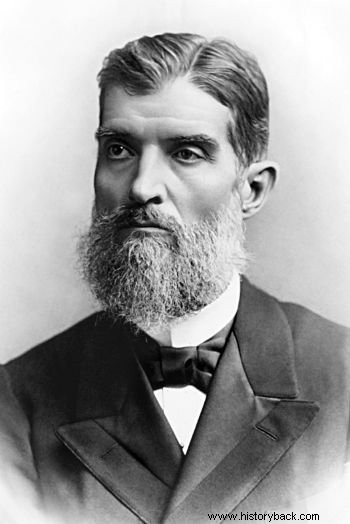Prudente de Moraes was a Brazilian politician and the 3rd President of Brazil Republic, which ruled the country from 1894 to 1898.
 Prudente de Moraes was the 3rd president of Brazil
Prudente de Moraes was the 3rd president of Brazil
Biography
Prudente José de Moraes Barros was born in the municipality of Itu, in the interior of São Paulo, on October 4, 1841. Son of farmers José Marcelino de Barros and Catarina Maria de Moraes. He was orphaned by his father early on (who had been murdered by a slave), which took his family to another city in the interior of São Paulo:Constitution (currently Piracicaba).
He decided to pursue a political career and later entered the Law School of Largo São Francisco, in São Paulo, graduating in 1863. Consequently, in 1866, he married Adelaide Benvida, with whom he had 9 children. He died in Piracicaba, on December 3, 1902, aged 61, a victim of tuberculosis.
Government of Prudente de Moraes
From a young age, Prudente de Moraes turned to the law. He worked as a lawyer and also held several political positions, thus consolidating his image:first Civil President of the Republic of Brazil, president of the City Council and City Councilor of the City of Constitution (currently Piracicaba), provincial deputy of the State of São Paulo (elected three times ) and deputy of the General Assembly of the Empire.
In the provisional government of Marechal Deodoro, after the Proclamation of the Republic (1889), he was nominated for the position of governor of the province of São Paulo, remaining until the following year. It is interesting to note that, in 1891, Moraes contested the presidency of the republic against Marechal Deodoro, however he did not hold the position.
However, after the government of Floriano Peixoto, Prudente again ran for the presidency, running against Afonso Pena , which won with 276,583 votes against 38,291 for his opponent, starting the period that became known as “República das Oligarquias ”, characterized by the dominance of farmers from São Paulo and Minas Gerais, for political positions in the country.
Furthermore, Rui Barbosa put an end to the República da Espada period (Government of two soldiers:Marechal Deodoro and Floriano Peixoto) being the first civilian to hold the position of the Presidency of Brazil, taking office on November 15, 1894.
During his government, he resolved diplomatic issues (with England, France, Portugal, Switzerland, Japan), proposed an economic plan, fought inflation, however, increased the country's foreign debt, since the encilhamento policy (1890), previously proposed by Rui Barbosa , represented one of the worst economic crises in the country. So, to try to maintain balance, Prudente increased the external debt and contracted loans to contain inflation.
During his political career, he changed political parties:initially (in the Empire) he was part of the Liberal Party (PL), where he remained until 1873; and the Republican Party (Paulista and Federal), affiliated from 1873 to 1902.
Read more:
- Brazil Republic,
- Deodoro da Fonseca,
- Rui Barbosa
- Encilhamento
- Constitution of 1891
War of Straws and Federalist Revolution
During his government, Rui Barbosa enjoyed great popularity, and became known as the “peacemaker” as he took peace measures to end the Federalist Revolution (1893-1895), in the south of the country, and the War of Straws (1896 and 1897), in the hinterland of Bahia.
Despite defending peace, Prudente de Morais defended the republic, abolitionism and national unity. In the words of a politician:“I am Prudent in name, prudent by principle, and prudent by habit. I am also prudent, seeking to avoid odious personal issues .”
To learn more:
- War of Straws
- Federalist Revolution
- Abolitionism
